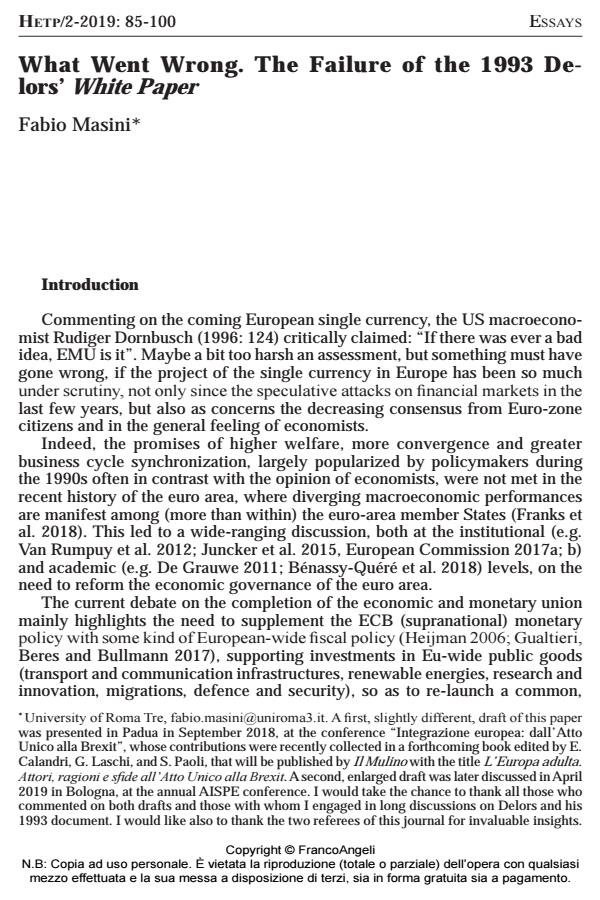What Went Wrong. The Failure of the 1993 Delors’ White Paper
Titolo Rivista HISTORY OF ECONOMIC THOUGHT AND POLICY
Autori/Curatori Fabio Masini
Anno di pubblicazione 2020 Fascicolo 2019/2
Lingua Inglese Numero pagine 16 P. 85-100 Dimensione file 225 KB
DOI 10.3280/SPE2019-002004
Il DOI è il codice a barre della proprietà intellettuale: per saperne di più
clicca qui
Qui sotto puoi vedere in anteprima la prima pagina di questo articolo.
Se questo articolo ti interessa, lo puoi acquistare (e scaricare in formato pdf) seguendo le facili indicazioni per acquistare il download credit. Acquista Download Credits per scaricare questo Articolo in formato PDF

FrancoAngeli è membro della Publishers International Linking Association, Inc (PILA)associazione indipendente e non profit per facilitare (attraverso i servizi tecnologici implementati da CrossRef.org) l’accesso degli studiosi ai contenuti digitali nelle pubblicazioni professionali e scientifiche
In the late 1980s and early 1990s a process was started that would lead to the single currency in Europe. The choice made for its governance relied on an intergovernmental monitoring over convergence, based on the strict compliance to the Maastricht criteria. The White Paper of the Delors’s Commission on Growth, Competitiveness, Employment was issued in September 1993 to face the new internal and external threats to the European economies. It provided a framework for policy-action that should accompany the building of the euro and help the European economy survive the challenges of globalization, sustainability and new ICTs. The paper aims to examine the White Paper of 1993, and to analyse the reasons why it was neglected and eventually set aside by the member States, thus weakening the long-term prospects of the European economy and the sustainability of the forthcoming European single currency.
Parole chiave:Delors, European integration, unemployment, monetary union, fiscal stimulus
Jel codes:B31, E02, F15, H79
- Jacques Delors Laurent Warlouzet, pp.93 (ISBN:9782111741607)
- European Economic Governance and Constitutional Uncertainty Fabio Masini, in Nova Economia e8556/2024
DOI: 10.1590/0103-6351/8556
Fabio Masini, What Went Wrong. The Failure of the 1993 Delors’ White Paper in "HISTORY OF ECONOMIC THOUGHT AND POLICY" 2/2019, pp 85-100, DOI: 10.3280/SPE2019-002004